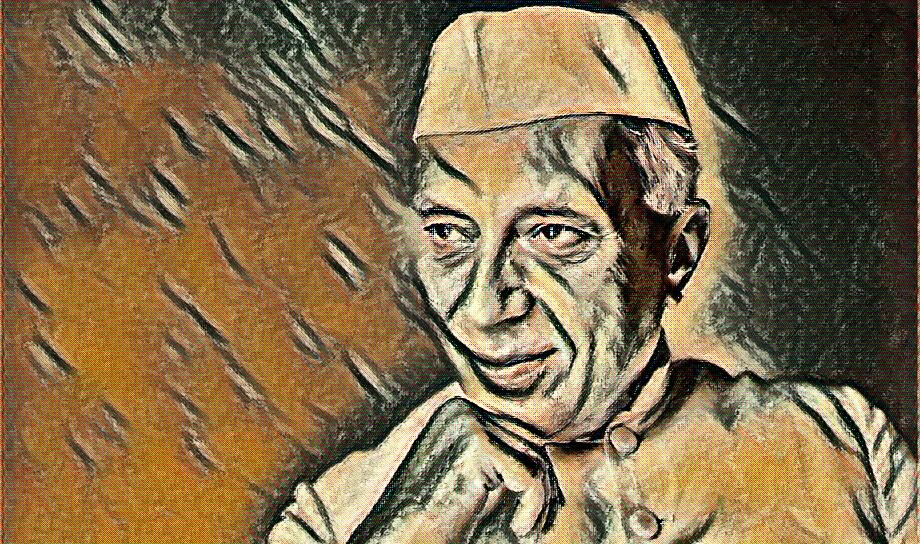Jawaharlal Nehru (1889-1964 C.E.) was the first Prime Minister of Independent India. He was born on November 14, 1889 in Allahabad, India. His father, Motilal Nehru, was a well-known eminent lawyer who belonged to Kashmiri Pundit’s community.
Nehru family was elitist in most of their practices and English was spoken and encouraged. His father, Motilal Nehru appointed English and Scottish teachers to supervise his children’s education at home under private tutors. At the age of fifteen, he went to England and after two years at Harrow, joined Cambridge University to obtain a degree in natural sciences. After spending two years at the Inner Temple, London, he qualified as a barrister and studied subjects like literature, politics, economics, and history. He returned to India in 1912 and plunged straight into politics. In 1912, he attended the Bankipore Congress as a delegate, and became Secretary of the Home Rule League, Allahabad in 1919. In 1916 he had his first meeting with Mahatma Gandhi and felt immensely inspired by him. In 1916 Nehru married to Kamala Kaul, known as Kamla Nehru and his only daughter Indira was born a year later in 1917. He was elected as the president of the Allahabad municipal corporation in 1920. He organised the first Kisan March in Pratapgarh District of Uttar Pradesh in 1920. He was twice imprisoned in connection with the Non-Cooperation Movement of 1920-22. During the Non-Cooperation movement of 1921, Kamala played a vital role by organizing groups of women and picketing shops selling foreign cloth and liquor in Allahabad.
Pt. Nehru became the General Secretary of the All India Congress Committee in September 1923. He toured Italy, Switzerland, England, Belgium, Germany and Russia in 1926. In Belgium, he attended the Congress of Oppressed Nationalities in Brussels as an official delegate of the Indian National Congress. He also attended the tenth anniversary celebrations of the October Socialist Revolution in Moscow in 1927. While leading a procession against the Simon commission, he was lathi-charged in Lucknow in 1928. During the Guwahati Session of the Congress in 1928, Mahatma Gandhi announced that the Congress would launch a massive movement if the British did not grant dominion status to India within the next two years. It was believed that under the pressure of Nehru and Subhash Chandra Bose, the deadline was reduced to one year. Jawaharlal Nehru criticized the famous “Nehru Report” prepared by his father Motilal Nehru in 1928 that favored the concept of a “dominion status for India within the British rule”. In 1929, Pt. Nehru was elected President of the Lahore Session of the Indian National Congress, where complete independence for the country was adopted as the goal. He was imprisoned several times during 1930-35 in connection with the Salt Satyagraha and other movements launched by the Congress. He completed his ‘Autobiography’ in Almora Jail on February 14, 1935. After release, he flew to Switzerland to see his ailing wife and visited London in February-March, 1936. He also visited Spain in July 1938, when the country was in the throws of Civil War. Just before the court-break of the Second World War, he visited China too.
On October 31, 1940 Pt. Nehru was arrested for offering individual Satyagraha to protest against India’s forced participation in war. He was released along with the other leaders in December 1941. On August 7, 1942 Pt. Nehru moved the historic ‘Quit India’ resolution at the A.I.C.C. session in Bombay. On August 8,1942 he was arrested along with other leaders and taken to Ahmednagar Fort. This was his longest and also his last detention. In all, he suffered imprisonment nine times. Post his release, he threw himself into a series of rigorous discussions and negotiations with the British Government that ultimately led to attainment of freedom in 1947.
On August 15, 1947, a free India was born. Nehru was elected as the first Prime Minister of independent India. He was the first PM to hoist the national flag and make his iconic speech “Tryst with Destiny” from the ramparts of the Lal Quila (Red Fort). He implemented a number of socio-economic reforms and paved the way for rapid industrialization. In the year 1949, Jawaharlal Nehru made his first visit to the United States, seeking a solution to India’s urgent food shortage. In 1951, Jawaharlal Nehru launched the country’s “First Five-Year Plan” emphasizing on the increase in the agricultural output. On October 20, 1962, the People’s Liberation Army attacked India simultaneously from two disputed fronts. They captured Rezang la in Chushul and Tawang in Arunachal Pradesh. A month into the armed confrontation, the Chinese declared a ceasefire on November 20, 1962 but the deep sense of mistrust strained the political relations between the two country ever since. In 1964, Jawaharlal Nehru suffered a stroke and a heart attack. On 27 May 1964, Nehru passed away. Nehru was cremated at the Shantivana on the banks of the Yamuna River, Delhi.
Pandit Nehru was adored by children who fondly called him Chacha Nehru. He had immense love for children and his birthday, November 14, is celebrated as Children’s day in India. Children’s Day is also known as Bal Divas. He paved way for India’s educational exaltation by envisioning the country’s top tier institutions like Indian Institute of Technology, All India Institute of Medical Sciences and India’s first space program. Pundit Jawaharlal Nehru was a great writer and the poet. The Discovery of India and Glimpses of World History are some of his well-known books. Shyam Benegal made this television series ‘Bharat Ek Khoj’ based on Nehru’s famous book, Discovery of India.


0 comments on “Pundit Jawaharlal Nehru Jayanti”Add yours →